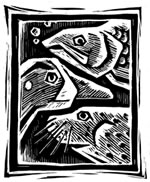- Home
- Restoration Projects
- Project Search
- Long-term Monitoring of Marine Conditions and Injured Resources 21120114
Project Information
Title: Long-term Monitoring of Marine Conditions and Injured Resources 21120114
Project Year and Number: 2021: 21120114
Other Fiscal Years and Numbers for this Project: 2022: 2222LTRM, 2020: 20120114, 2019: 19120114, 2018: 18120114, 2017: 17120114, 2016: 16120114, 2015: 15120114, 2014: 14120114, 2013: 13120114, 2012: 12120114
Principal Investigator (PI): Mandy Lindeberg (NOAA/NMFS Auke Bay Laboratory)
Managing Agency: NOAA
Assisting Personnel: None
Project Website: https://gulfwatchalaska.org/
Research Location: Gulf of Alaska
Restoration Category: Monitoring, Research
Injured Resources Addressed: Black Oystercatchers, Clams, Common Murres, Harlequin Ducks, Intertidal Organisms, Killer Whales, Kittlitz's Murrelets, Marbled Murrelets, Mussels, Pacific Herring, Pigeon Guillemot, Sea Otters, Sediments, Subtidal Organisms
Abstract:The Gulf Watch Alaska (GWA) program directly addresses the Exxon Valdez Oil Spill (EVOS) Trustee Council’s (EVOSTC’s) focus area, integrated long-term monitoring of marine conditions and injured resources services. The overarching goal of GWA is to provide sound scientific data and products that inform management agencies and the public of changes in the environment and the impacts of these changes on injured resources. GWA has a consortium of 12 projects organized in the following functional groups: three monitoring components (environmental drivers, pelagic, and nearshore), a program management team, a science review panel, a science coordinating committee, and an outreach steering committee.
The program has five primary objectives: 1) sustain and build upon existing time series in the EVOS-affected regions of the Gulf of Alaska, 2) provide scientific data, data products and outreach to management agencies and a wide variety of users, 3) develop science synthesis products to assist management actions, inform the public and guide monitoring priorities for the next 15 years, 4) continue to build on collaborations between the GWA and Herring Research and Monitoring programs, as well as other EVOSTC program focus areas including the data management program, lingering oil and potential cross-program publishing groups, and 5) leverage partnerships with outside agencies and groups to integrate data and expand capacity through collaborative efforts.
Sampling and outreach activities during FY20 have been disrupted by the novel coronavirus pandemic. However, some GWA projects have found ways to continue collecting data and maintain their long-term legacy datasets. In FY21, the program management team will continue to work with EVOSTC staff to revise and finalize the science synthesis report after a successful workshop with the Science Review Panel. Work on syntheses, peer reviewed publications, ecosystem indicators, and final reports will be a focus for the program as the end of the 5-year funding cycle approaches. Overall, there are no changes to GWA program management. Due to COVID-19 impacts, several projects have requested moving funds between categories for the remainder of FY20 and during FY21.
Proposal: View (3,137 KB)
Reports:
FY17-21 Final Report: View (7,265 KB)
Publications from this Project: None Available
